…the digital transition requires adaptability in an unprecedented manner for individuals and organizations.
They say ‘When in doubt, write it out.’ If that’s the case, then the entire world should be writing, and according to Google, everyone is—or at least, well on their way. The past few years have been filled with great uncertainty and with it, presenting new ways of communicating, living, organizing, and meeting our organizational goals. Recently, I have navigated changes in countries, careers, colleagues, friendships, and now, workspaces. Suffice it to say that the digital transition requires adaptability in an unprecedented manner for individuals and organizations. The global shifts are expansive. They not only have historical grounding but for the first time, the environment is uniquely positioned as a beneficiary of peace and justice. How do we guide those around us from the world that was towards readiness for the unfolding changes of tomorrow? These are some of the uncertainties we grapple with, and a few I hope we can reflect on.

Inspiration
The global pandemic served as a preview of what widespread alterations would entail and expect of its institutions. From medicine, to finance, social development, to the eco-system- it was the kind of change that reminded us all of how interconnected we were. It also revealed how isolated many sectors had been functioning, creating challenges in both crisis response and implementing ongoing programs. But more significantly, the global health crisis gave us a common language for centering people and their wellness. It further lifted the veil of systemic bureaucracy as people who too deserve protection but whose organizational culture required scrutiny, and in some cases, reproach.
The world ahead
But how will we fair in the just climate transition, the African Free Trade (AfCFTA) and BRICS (Brazil, Russia, India, China, South Africa) agreements, or moreover, when history beckons like it is today seeking justice for crimes of the past? These are all transitions that have the same objective yet different approaches to the political transitions in the 80s and 90s. Instead of foregrounding peace like the former, the focus is on creating societies that are just and doing so in a way that will maintain current institutions of peace. This does not mean we live in a world that is without conflict and a huge part of the field will always be dedicated to ending ongoing hostilities, facilitating electoral power, and establishing rule of law institutions. What the just transitions mean is that justice has a stronger relationship with history, where economic redistribution is pivotal, and humanity’s obligations extend beyond itself.
In short, welcome to my website. I hope you will join me as I navigate the “write” side of the transition, where we all hopefully end up on the Just side of history.
Until next time,
Mosa